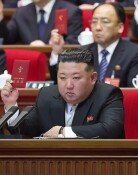Election law needs reform to ensure freedom of political election
Election law needs reform to ensure freedom of political election
Posted April. 26, 2021 07:22,
Updated April. 26, 2021 07:22
The National Election Commission (NEC) submitted a revised bill on the Public Official Election Act to expand freedom of political expression used for facilities and printouts. It caused controversy during the April 7 by-election campaign by restricting phrases that can imply a particular political party or affect election results such as “Incapability,” “Think about what brought us to these by-elections” and “Naeronambul,” which means “If I do it, it is a romance but if you do so, it is an adulterous affair.” The purpose of the election agency’s amendment is to scrap the Articles 90 and 93, based on which the restriction on the phrases in question was imposed, while allowing for autonomous ways of expression to promote turnouts except explicit specifications of names of political parties and candidates.
The NEC’s decision to ban the use of certain words such as “Naeronambul” in placards did not go in line with the general consensus. By translating the related articles too narrowly, the national agency caused controversy over its favoritism. However, regardless of whether its ban was reasonable, it is clear that the articles in question come across as anachronistic clauses. A long while ago, bans were lifted on election campaigns mounted by phone or verbally. Thus, it is an excessively restrictive measure to ban identical phrases from being used for facilities and printouts only.
The proposal on the revision also requests that an official election campaign should allow voters to design or buy caps, sashes or shirts with political parties’ numbers or candidates’ names expressly printed on them. As the current law limits freedom of political expression and freedom of election campaign too harshly by allowing only candidates, their spouses and election campaigners to engage in campaign activities wearing identifiable items, it needs revising as well.
Despite the NEC’s previous legislative proposals to revise the election act in 2013 and 2016, its efforts did not come to fruition because the National Assembly saw the issue from a perspective of whether a revision benefits the election system or otherwise without any determination to consider a heightened level of public awareness of politics or new trends in election campaigns. The ruling and opposition parties are not supposed to narrow the focus on insignificant gains and losses but should nip in the bud any controversy over the NEC’s partiality. As next year sees the presidential election happen in March and the local elections in June, the National Assembly has to accept the NEC’s proposal to initiate the revision requested.







